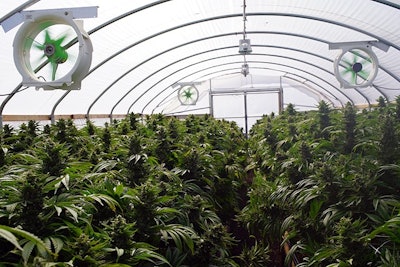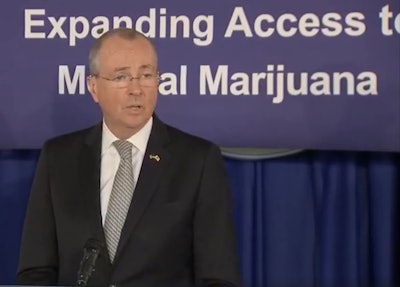
New Jersey Gov. Phil Murphy announced on March 27 broad expansions to the state’s medical marijuana program. Chief among the changes: Five new categories were added to the state's list of qualifying conditions: anxiety, migraines, Tourette syndrome, chronic pain relating to musculoskeletal disorders and visceral pain relating to internal organs.
The announcement comes 60 days after Murphy's promise to review the access to and costs of medical marijuana in the state. That promise resulted in a 26-page executive order report, embedded below, which addresses the shortcomings of New Jersey’s 2008 medical marijuana legislation and the potential for safer, more widespread access to the plant.

“The days of making residents jump through hoops are coming to an end,” Murphy said in Trenton on March 27. “When an emergent need shows itself, patients should not have to wait for bureaucracy to catch up.”
The state's Department of Health (DOH) will be empowered to add qualifying conditions. Murphy said that he’d like to see the department include opioid addiction as a condition—and that, perhaps the Garden State can be a national leader inusing medical marijuana as an “offensive weapon” in the fight against the country’s opioid crisis.
Additionally, program registration costs will be halved, dropping from $200 to $100. Senior citizens and veterans will be extended a $20 registration rate.
Once patients are registered, they must identify a single treatment center (or dispensary) where they will purchase marijuana, at least for now. Murphy, citing the report, said he will support legislation to allow patients to make purchases at more than one location, as well as legislation to allow edibles to be sold and purchased by adult patients.
“Since 2010 reality has never matched the promise [of the Medical Marijuana Patient Protection Act of 2008],” Murphy said. “Today is the first step in restoring that promise.” (In a recent nationwide report on medical marijuana programs, compiled by Americans for Safe Access, New Jersey received a “C”.)
Murphy spoke at length on the perils of the stigma that remains attached to marijuana use in the U.S. With that in mind, the state will no longer mandate that doctors publicize their name and professional information on a state database of physicians willing to recommend medical marijuana. (Doctors may still opt in to that list.)
Murphy mentioned multiple future goals for the program, reiterating his wish that opioid addiction be included in the qualifying conditions list and his hope that home delivery will be state-regulated.
“Today is the beginning of a shift in the culture of the program,” Jackie Cornell, deputy commissioner of the DOH, said, acknowledging the extensive patient and stakeholder feedback that went into the state’s report.
Still, Murphy said this process is ongoing. During a question-and-answer session with the press, he said that there are no plans to allow home grow in New Jersey. The report makes no recommendation on that matter.
“My gut tells me—this is my personal opinion—that you want this properly regulated, you want this properly understood,” the governor said. "My gut would be no."
Murphy insisted that there will be more news to come from the state Department of Health.
“This isn’t the end of history,” he said. “This is where we are today.”
Read the full executive order report here:
New Jersey Dept. of Health Executive Order 6 Report by sandydocs on Scribd
Top photo courtesy of Adobe Stock


























